Klonopin is a drug that is used to treat anxiety disorders. It belongs to the class of drugs known as benzodiazepines, which are used for treating various types of conditions including alcohol withdrawal, epilepsy, insomnia, and panic disorders.
Klonopin has been approved by the U.S. Food and Drug Administration (FDA) for use in adults who have severe anxiety but not other conditions such as depression or bipolar disorder.
This post will go into more detail about what Klonopin is, how it works best for certain people, dosage information based on current research studies conducted with this medication, and any potential side effects that may occur when taking Klonopin.
Contents
- 1 Important Information About Klonopin
- 2 Side Effects of Klonopin
- 3 Klonopin Vs. Other Antianxiety Medications
- 4 Interaction And Medical Issues Associated With Klonopin
- 5 Klonopin Withdrawal Symptoms
- 6 On Overdosing Klonopin
- 7 Expert Comments On Klonopin For Anxiety
- 8 DISCLAIMER
- 9 Conclusion
- 10 A Word From Therapy Mantra
Important Information About Klonopin

Klonopin is a medication that is used to treat anxiety disorders. It belongs to the class of drugs known as benzodiazepines, which are medications that act on the central nervous system and have sedative, hypnotic, anxiolytic, anticonvulsant, and muscle relaxant properties.
Benzodiazepines were some of the first medications to be approved for use in the treatment of anxiety disorders. And is still considered a mainstay of therapy for these conditions. Klonopin is one such drug that has been FDA-approved specifically for the treatment of severe anxiety in adults.
NOTE: Klonopin was first approved for use by the FDA in 1975.
Action Mechanism
It is not entirely clear how Klonopin works to reduce anxiety. But it is known that the drug affects several neurotransmitters in the brain that are involved in mood and emotional regulation.
These neurotransmitters include serotonin, GABA, and dopamine. Klonopin may work by increasing the activity of GABA receptors in the brain, which can help to calm and relax the nervous system.
Gaba Receptors
It is an acronym for the neurotransmitter gamma-aminobutyric acid. These receptors are one of many different types of receptors in the brain and nervous system. They serve to help transmit messages between two nerve cells that have membranes that are electrically active due to their exposure to neurotransmitters.
NOTE: By increasing activity at various GABA receptors, Klonopin can help to decrease anxiety and produce a calming effect.
Who Should Take Klonopin
Klonopin is not straight away approved for use in children, adolescents, or pregnant women. It should also not be used in conjunction with other medications that have a sedative effect, such as alcohol or opioids.
People with certain medical conditions should not take Klonopin as well, including:
- Liver or kidney disease
- Sleep apnea
- Glaucoma
- Myasthenia gravis
- Pregnancy
Can Children Take Klonopin
Yes, children can take Klonopin but the dose must be adjusted to their weight and age. The drug should not be given to a child without consulting with a pediatrician first.
Typical Dose of Klonopin To Be Prescribed
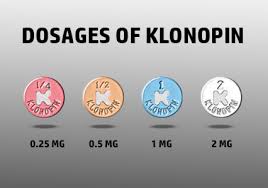
The recommended starting dose of this medication is 0.25 mg twice daily, which can be increased to a maximum of three times per day or higher if necessary (up to a maximum dose of 20 mg per day).
You mustn’t increase your dosage on your own or take more than the prescribed amount – doing so can be dangerous and may lead to dependence on Klonopin.
NOTE: The dose must be individualized to each person, as too high of a dose can lead to excessive sedation and cognitive impairment, while too low of a dose may not be effective in treating the anxiety.
If I Miss A Dose
If you forget to take a dose of Klonopin, take it as soon as you remember. And, if the next dose is less than 12 hours away, skip the missed dose and continue your regular schedule. Or if more than 12 hours have passed since you forgot to take a dose of Klonopin, do not double up on doses or increase how many times per day that you take this drug. Instead, take your next dose at the time that you would normally take it and continue to do so every 12 hours thereafter until you have taken all of your daily doses in a row.
NOTE: If a significant amount of time has passed between doses, contact an addiction specialist for more information about what could have gone wrong with your dosage scheduling.
Side Effects of Klonopin
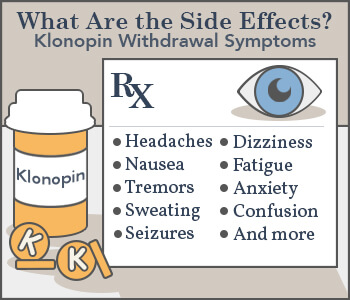
Common Side Effects
Klonopin can cause several side effects but is generally well-tolerated. These side effects include:
Drowsiness
Lethargy, fatigue, and drowsiness are among the most common Klonopin side effects that people experience while taking this drug. If you feel like you can’t stay awake or if your sleep schedule starts to change, talk with your doctor about changing medications. So that you can find one that doesn’t cause this problem.
Dizziness
Some people find that this medication makes them dizzy and lightheaded. This is most common when standing up after sitting or lying down. So be sure to get up slowly and cautiously to avoid any falls.
Slurred speech
In some cases, Klonopin can also lead to slurred speech and difficulty speaking. If you experience any changes in your ability to communicate while taking this medication, let your doctor know right away.
Memory problems
Klonopin may also cause memory problems, which may range from mild to severe. If you experience any issues with your memory while taking Klonopin, talk with your doctor right away. As it could be a sign of dependence on the drug and/or withdrawal symptoms after stopping treatment.
Confusion
In some cases, Klonopin can also confuse. If you start to feel confused or foggy-headed while taking this medication, talk with your doctor about whether it’s the right drug for you.
Loss of appetite
Klonopin can also lead to a loss of appetite, which could be dangerous if it becomes severe. If you start to lose interest in food and stop eating altogether while taking this medication, talk with your doctor.
Reduced sex drive and sexual dysfunction
Some people also experience reduced libido or difficulty with sexual function when they take Klonopin. If you start to notice a decline in your sex life while on this drug, talk with your doctor about whether something else might be causing the problem.
Sensitivity to sunlight
Some people find that they become more sensitive to sunlight after starting Klonopin therapy. If you start to experience sunburns more easily or if your skin becomes more irritated, talk with your doctor about whether you need to wear sunscreen or limit your time in the sun while taking this drug.
Urinary problems
Klonopin can also cause urinary problems, such as an increased need to urinate, pain or burning while urinating, or blood in the urine. If you experience any of these problems, talk with your doctor.
Changes in weight
Klonopin can also cause weight changes, either an increase or a decrease. If you start to experience significant changes in your weight while taking this medication, let your doctor know.
NOTE: These side effects usually improve over time as the person becomes used to taking Klonopin. However, if they become problematic, talk to your doctor about changing your dosage schedule or taking a different medication.
Rare Side Effects
Klonopin can cause serious side effects in some people, including:
Depression
Klonopin can also cause depression in some people, so it’s important to keep an eye on your mood while taking this medication. If you experience any significant changes in your mood, talk to your doctor.
Suicidal thoughts
In some rare cases, Klonopin may also lead to suicidal thoughts. If you experience any unusual changes in your thinking or behavior – including feelings of wanting to hurt yourself – let your doctor know right away.
Hallucinations
Klonopin can cause hallucinations in some cases, so if you experience any visual disturbances or issues with your vision while taking this medication, let a doctor know right away.
Seizures
While seizures are rare when it comes to Klonopin side effects, they do occur from time to time. If you have had a history of seizures or if you experience any seizures while taking Klonopin, let your doctor know as soon as possible.
Heart palpitations and heart issues
In rare instances, Klonopin can also lead to heart problems like decreased blood pressure or irregular heartbeat. If you experience any changes in your heart rate while taking this medication, talk with your doctor right away.
Increase in blood pressure
Klonopin can also cause an increase in blood pressure, which is a serious side effect. If you find that your blood pressure becomes elevated while taking this drug, talk with your doctor about whether to continue or switch medications – and take it easy on yourself if you’re asked to stop Klonopin.
Increase in heart rate
Klonopin can also cause an increase in your heart rate, which could be dangerous if it becomes severe enough. If you find that your heartbeat increases while taking this medication, let a doctor know right away – and take care with any physical activity to avoid any problems.
NOTE: If you have suicidal thoughts or behavior while taking Klonopin and are feeling depressed, talk to your doctor about changing medications. Suicidal thoughts may also be a sign of a more serious mental health condition that requires treatment.
Klonopin Vs. Other Antianxiety Medications
Multiple medications can be prescribed for the treatment of anxiety disorders, and some individuals may respond better to one over another. Some people also prefer one medication over another due to side effects or the cost of each type.
Klonopin is commonly used as an alternative therapy in place of benzodiazepines, which are also medications that can be prescribed for anxiety disorders. Benzodiazepines include such drugs as Valium and Xanax, although they have been replaced by newer, more effective drugs on the market.
Alternatives To Klonopin
There are also some alternatives to Klonopin that a doctor might consider prescribing, including:
Buspirone (BuSpar)
This medication is not specifically indicated for the treatment of anxiety disorders but helps treat acute panic attacks and may be used off-label for generalized anxiety disorder.
Gabapentin (Neurontin)
This medication is used to treat seizures and nerve pain but has also been found to be effective in the treatment of some cases of social phobia and panic disorder.
Pregabalin (Lyrica)
Another medication used to treat seizures and nerve pain, Pregabalin has also been found to be effective in the treatment of anxiety disorders, including generalized anxiety disorder and social phobia.
NOTE: Many other medications can be prescribed for the treatment of anxiety disorders – these are just a few examples. Speak with your doctor if you are not happy with your current medication regimen or if you have any questions about potential alternatives.
Klonopin Vs. Xanax
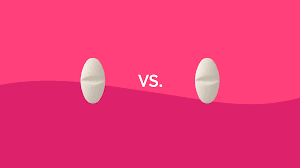
There are a few key differences between Klonopin and Xanax, which is why they are often prescribed to different individuals. Klonopin is a long-acting benzodiazepine, meaning that it stays in your system for a longer period of time than Xanax, which is a short-acting benzodiazepine.
Klonopin can also be taken in lower doses to treat anxiety symptoms than Xanax, and it has been shown to produce fewer side effects overall. However, some individuals may react better to one medication over the other – discuss with your doctor if you are not happy with your current medication.
How Long Does Klonopin Stay In Your System?
Klonopin stays in your system for a longer period of time than Xanax, which is a short-acting benzodiazepine. This means that it will take longer for the drug to leave your body and that you may experience residual effects from the medication for a longer period of time.
Interaction And Medical Issues Associated With Klonopin
Several medications can be potentially dangerous when taken with Klonopin, including:
Antidepressants
This class of drugs causes seizures in individuals who take benzodiazepines. Some antidepressants also have the side effect of making the individual more sensitive to low doses of Klonopin or other similar medications and may cause a lethal interaction if taken together.
Some examples of antidepressants that interact with Klonopin include:
- Fluoxetine (Prozac)
- Paroxetine (Paxil)
- Sertraline (Zoloft)
- Venlafaxine (Effexor)
Antihistamines
Many of the most common antihistamines are also sedating and may cause drowsiness in some people. If you take an antihistamine with Klonopin, there is a risk that it will reduce your ability to stay awake or alert while driving or participating in other activities that require concentration.
Some examples of antihistamines that interact with Klonopin include:
- Chlorpheniramine (Chlor-Trimeton)
- Diphenhydramine (Benadryl)
- Brompheniramine (Dimetane, Bromdaylin, and others)
- Pseudoephedrine (Sudafed)
Opioids
Opioids are medications that are often helpful for the treatment of pain and include drugs such as morphine, hydrocodone, and oxycodone. These medications can cause serious respiratory depression when taken with Klonopin and may lead to death.
Examples of opioids that interact with Klonopin include:
- Morphine (Astramorph, Duramorph, and others)
- Codeine (Tylenol #0-Cough Suppressant)
- Hydrocodone/Acetaminophen (Lortab ASA, Vicodin)
- Oxycodone (Percocet, OxyContin)
Medical Conditions Unfit For Klonopin Therapy
There are a few medical conditions that would make someone ineligible for Klonopin therapy. These conditions include:
Seizure disorders
While Klonopin can be an effective treatment for anxiety disorders, it is also a very powerful medication. If you have any seizure disorder or if family members on either side have a history of seizures, the risks that come with taking this drug may outweigh its benefits.
Kidney and liver problems
Klonopin (clonazepam) is one of the most metabolized benzodiazepines and can be very dangerous to individuals who have liver or kidney problems. Your doctor may need to prescribe a safer alternative if you suffer from either of these conditions – or, in some cases, refuse to prescribe Klonopin altogether.
Klonopin And Pregnancy
You should not take this medication if you are pregnant or plan to become pregnant within the next year. The risks with Klonopin use during pregnancy are evident in studies, however, doctors still believe that it is better for a woman who is currently taking Klonopin to remain on therapy than try to discontinue treatment at her own risk.
It is safe for a woman who is pregnant or nursing to stop taking Klonopin. But research advises discontinuation only under the guidance of her doctor. If you are currently on this medication and become pregnant, talk with your doctor about switching medications before it becomes an issue to reduce any risks that may occur.
If you are breastfeeding and taking Klonopin, it is best to discontinue treatment or talk with your doctor about switching medications. While the drug does pass through breast milk, any risks that come with its use during this time will most likely be less than the benefits of breastfeeding for both mother and child. If alternative treatments are not there, in that case, it is advisable to discontinue breastfeeding.
Klonopin Withdrawal Symptoms
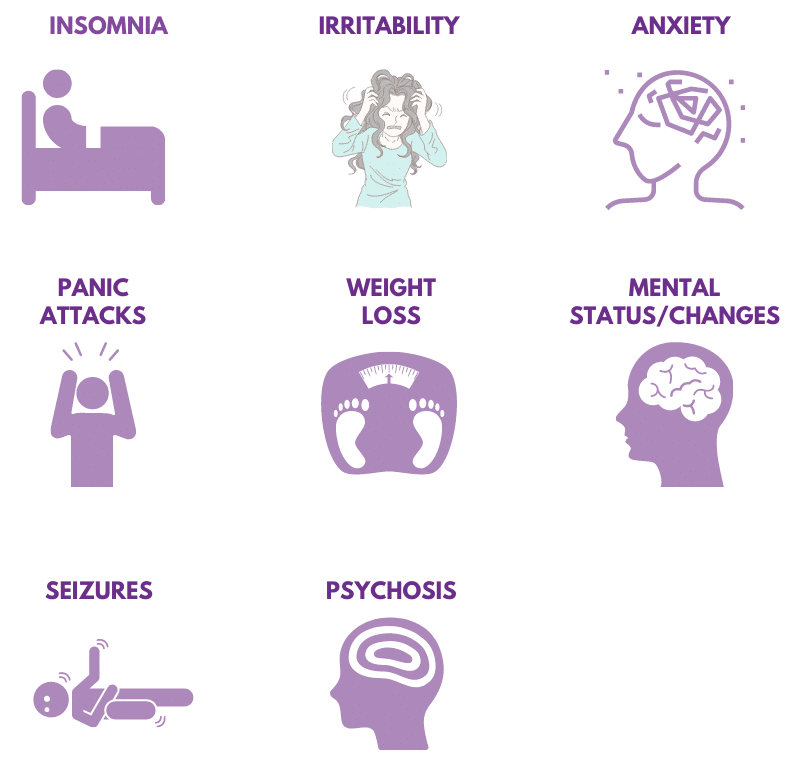
Yes, symptoms can occur if you discontinue Klonopin abruptly. Because Klonopin is a long-acting benzodiazepine, it takes time for the body to adjust after stopping treatment. Symptoms that may occur during this time include:
Rebound anxiety
This occurs when discontinuing Klonopin results in an increase in anxiety. This symptom usually subsides after a couple of weeks, but in severe cases can last up to several months or longer.
Rebound insomnia
This occurs when discontinuing Klonopin and results in an increase in difficulty falling asleep or staying asleep throughout the night (i.e., restless legs). In some instances, this symptom can persist for months or years after discontinuing Klonopin.
Hallucinations
This occurs in a very small percentage of people who discontinue Klonopin and people report seeing, hearing, feeling, or smelling things that are not there. This symptom usually resolves within a few days to weeks after discontinuing the medication. It is best to stay on a low dose of the medication if you are going through anxiety discontinuation and have hallucinations because it will take longer for your body to adjust after stopping treatment.
Seizures
This occurs in about 0-14% of people who abruptly stop taking Klonopin depending upon how long they were taking the medication and at what dose. The risk of seizures is highest when you stop Klonopin after taking it for more than a few weeks.
Klonopin Addiction
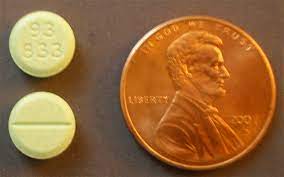
Klonopin is a Schedule IV drug, meaning that it has the potential for abuse and can be habit-forming. It is important to take this medication exactly as prescribed by your doctor. And not to increase or decrease the dosage without first consulting with him or her.
If you think that you or a loved one may be suffering from Klonopin abuse, please contact your doctor right away. So that treatment can begin immediately. It is important to realize the signs of this type of drug use to help avoid it. Here are some potential warning signs for prescription medication addiction:
- Taking more medication than prescribed
- Trying to get more prescription refills before your current supply runs out
- Falling asleep at inappropriate times of the day or night due to use of Klonopin (typically this occurs for those who take it in the evening)
- Constantly trying to find ways to obtain Klonopin from other people or through other means, such as the Internet – this is a sure sign of abuse
- Hiding your Klonopin use from family and friends (also known as “doctor shopping”)
- Feeling guilty when taking Klonopin – if you feel that it’s something you shouldn’t be doing, then there may be an underlying issue
- Losing interest in activities that you once enjoyed, such as hobbies and sports (this is also a sign of depression)
On Overdosing Klonopin

Overdosing on Klonopin will typically result in a person becoming unconscious or even passing out for an unknown amount of time. This can be dangerous and needs immediate attention by medical professionals. So, if you are experiencing these symptoms, call 911 or go to your nearest emergency room.
Symptoms of Klonopin overdose include:
- Drowsiness
- Slurred speech
- Lack of coordination
- Memory problems
- Confusion
- Depression
If you are experiencing any of these symptoms after taking Klonopin, it is important to seek medical help right away.
Seeking Medical Help
Some people may experience the above symptoms due to “high anxiety” or even other causes. However, it could be an indication that Klonopin is not the best medication for you. And it’s time to talk with your doctor about other options. There are a variety of medications that can be a possible prescription for anxiety. So finding one that works well for you should not be too difficult.
Expert Comments On Klonopin For Anxiety
“Klonopin is a benzodiazepine that is one of the go-to prescriptions to treat anxiety and panic disorders. It can be effective in reducing symptoms of anxiety. But it also has the potential for abuse and you should only take it as per the prescription by your doctor. It is important to realize the signs of Klonopin abuse to help avoid it.”
Case Study
“Karen is a 38-year-old mother of two who has been struggling with anxiety for the past few years. She has tried various medications, including antidepressants and therapy. But nothing seems to help her symptoms significantly. Her doctor decides to prescribe her Klonopin after hearing that it can be helpful for some people with anxiety.
Karen starts taking Klonopin as prescribed and finds that her symptoms start to improve after a few weeks. She is still anxious, but the medication helps her to feel more in control and less overwhelmed. After about six months of taking Klonopin, she decides to wean herself off of it slowly under the guidance of her doctor. She experiences a few weeks of withdrawal symptoms. But eventually feels better and can manage her anxiety without medication.”
DISCLAIMER
This information cannot be a substitute for professional medical advice, diagnosis, or treatment. Always seek the advice of your physician or another qualified health provider with any questions you may have regarding a mental health symptom or medical condition. Never disregard professional psychological or medical advice nor delay seeking professional assistance because of something you have read on this or other websites!
Conclusion
Klonopin is a prescription drug that can be very helpful in the treatment of anxiety. It is important to take it as prescribed by your doctor and follow any guidelines he or she may have for dosage, discontinuation periods, etc.
If you feel like Klonopin isn’t helping your anxiety symptoms at all. Or if you are experiencing any of the warning signs for addiction, please talk with your doctor. There are a variety of medications that can be a suitable prescription for anxiety. So finding one that works well for you should not be too difficult.
A Word From Therapy Mantra
Your mental health — Your psychological, emotional, and social well-being — has an impact on every aspect of your life. Positive mental health essentially allows you to effectively deal with life’s everyday challenges.
At TherapyMantra, we have a team of therapists who provide affordable online therapy to assist you with issues such as depression, anxiety, stress, workplace Issues, addiction, relationship, OCD, LGBTQ, and PTSD. You can book a free therapy or download our free Android or iOS app.


